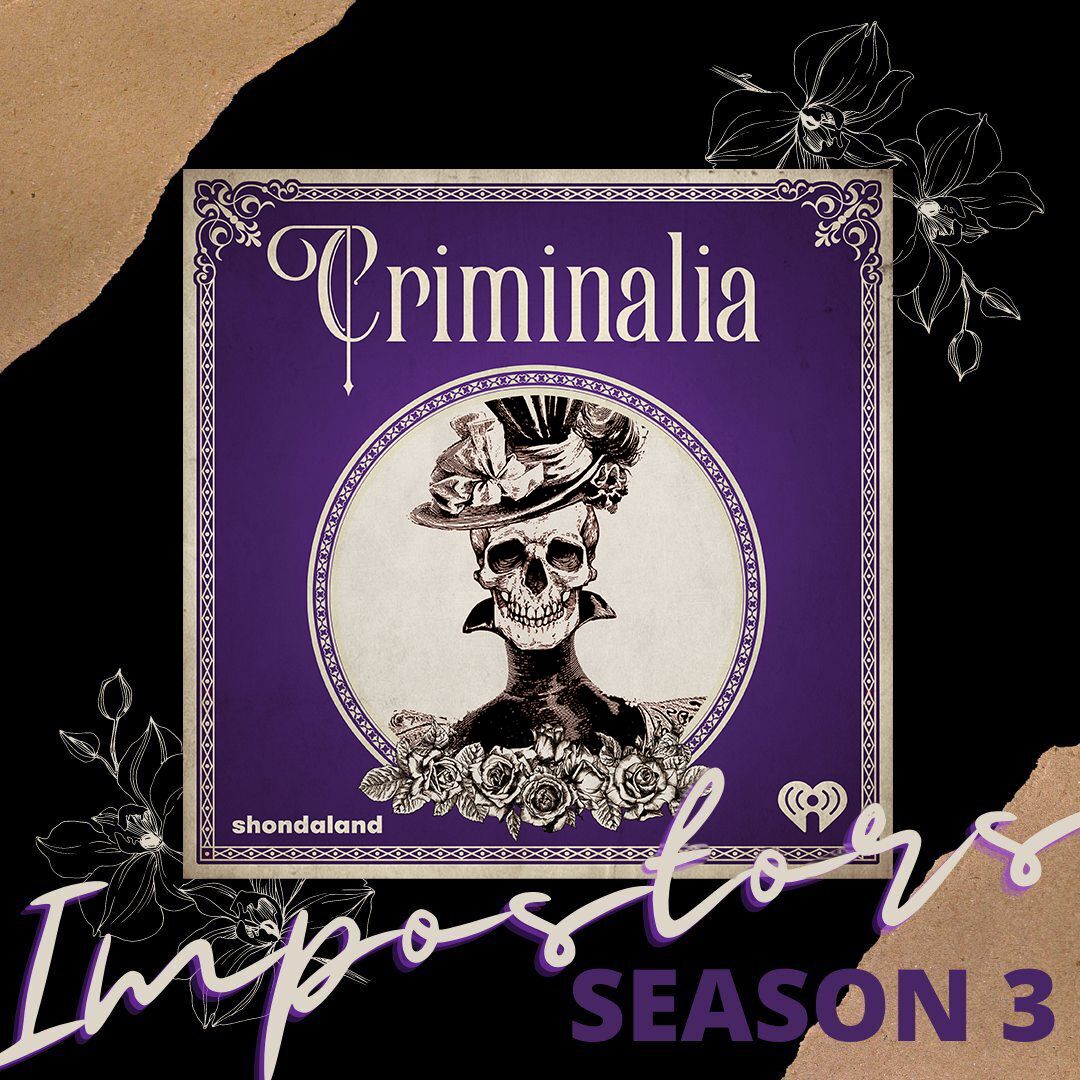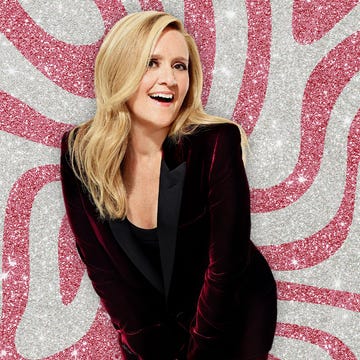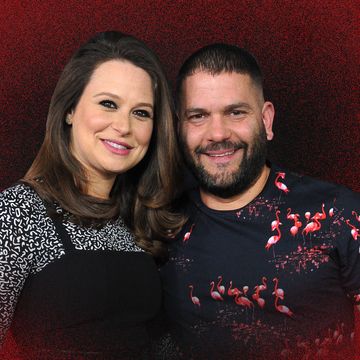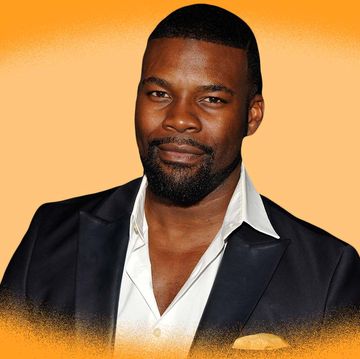The first season of Criminalia, which began airing last August, focused on stories of poisonings throughout history. The second season began in November and took on stalkers. Now, with a brand-new slate of stories, the podcast, hosted by Maria Trimarchi and Holly Frey, is tackling one of true crime’s most arresting of perpetrators: impostors. And though Shonda Rhimes’ next show on the Netflix docket, Inventing Anna, is indeed about one of pop culture’s current and most infamous impostors, Anna Delvey, this topic choice was purely a coincidence.
“This season is really varied,” says Trimarchi. “While they’re all impostors, it’s such a wide berth of who and what they’re pretending to be. And, while we might not all be able to relate to poisoning our husband, I think most of us can relate to pretending we’re someone else.”
If you’ve listened to previous episodes of Criminalia, you’ll be familiar with the show’s format: Introduce a person from the past — most often a woman — and then unpack the crime they committed. Season three is stacked with some intriguing folks from the annals of history as the hosts explore a dozen (plus one bonus!) fascinating personalities and the circumstances that led them to pretend to be someone else.
With season three now underway (click here to listen and subscribe), Shondaland took the opportunity to chat with the duo about impostors and why we love to hate them and, sometimes, hate to love them.
VALENTINA VALENTINI: What motivated you to pick impostors this season?
HOLLY FREY: We have a list of varieties of crimes that we want to eventually cover, and it felt like the right time for impostors.
VV: [Laughs] What does that mean?!
HF: It’s a little bit lighter than the others. Poisoning was super-fun, but it was a lot of murder and mental illness. The stalker season was very mental-illness heavy. With impostors, it’s not to say that no such events will pop up, but it’s just a little bit cheekier, and usually kind of funny, to pick apart how someone completely snowed various people into believing they were someone they were not.
MARIA TRIMARCHI: I really liked seeing how some people have been posing and pretending since a very young age and then just go, “Well, that’s just what I do.”
VV: Why do you think we love a good impostor story?
MT: Doesn’t everybody want to pretend they’re somebody else sometimes? I mean, I may not want to fleece the Rockefellers …
HF: You don’t?!
MT: [Laughs] Maybe in 1933 ... but I think it’s one of the things that people can look at and think, “Hey that might be fun.” When it comes to stalking, you don’t want those behaviors; you don’t want to be associated with stalking. Maybe you have a breakup, and you wonder if you’ve crossed the line, but that’s a much different season to impostors.
HF: It’s something I kind of refer to as superiority voyeurism. You can look at these stories from the safety of our homes and go, “I would never fall for that!” You can sometimes mock the people who get the wool pulled over their eyes. You feel a little smarter than them.
VV: Who are you looking at this season, and why?
MT: Well, we are looking at the original “Wolf of Wall Street,” who was not Jordan Belfort. Even though he’d like to think he was, he totally stole that. And we have a few others who were financial impostors; we also have one woman who pretended she was a princess, and, honestly, that probably would be okay with me. We have a woman who pretended she was a descendant of the Carnegie family.
HF: She actually said she was Andrew Carnegie’s daughter. It was before there was instant identification verification, and she would just walk into banks and get huge loans based on this assertion. They gave her loads of money. Tons.
VV: Has it been hard to narrow it down, or was it hard to find really great subjects to cover?
MT: I think it was a bit of both. It seemed to depend on where we were on the calendar. When we were wrapping up the first season of poisoners, it was hard to narrow it down. It was a long season, and we had a lot of great people to talk about. And it doesn’t matter what topic, but there are always one or two where you just can’t wait to dig into that!
HF: The other thing too is that it’s not just about having enough episodes per season as much as having a balanced season in terms of women, men, identity spectrum, the types of crimes they’re committing. You want it varied enough to maintain diversity in the story so that it doesn’t feel repetitive.
VV: The true-crime genre is still uber-popular and not going anywhere. Is there anything you’re seeing in that space that we should know about?
HF: We have the luxury of sidestepping a lot of that genre by doing historical true crime. Our whole approach is in some ways a show about culture and sociology. Here’s a bunch of crimes that happened in the past, which couldn’t happen in the present day, but also there are a lot of women who got the blanket vilification and became scapegoats for the societies they were living in. There were some too that when you pick them apart and look at the unique challenges of any given era that anyone lives in, sometimes these crimes feel a little bit more understandable, if not excusable. You still get an insight into how you perceive people in terms of labeling people good or bad or evil. That’s the fun part for us, that we have enough distance on it that we can dig into it and talk about it in ways that you can’t with a modern-day crime story.
VV: Podcasting in a pandemic — how’s that going?
HF: Well, Maria has the unique distinction that there was never a before-time for her. We started recording this show while we were already in a pandemic, but I had been doing other shows, so I had to shift gears to get used to doing it in my closet.
MT: I sit at a table; Holly sits in a closet [laughs]. We actually started our podcasting by getting together to do our brainstorming work, and it was about a week before everyone started wearing masks and stopped traveling. That feels so decadent now.
VV: What’s the inside joke about arsenic? It was mentioned in the first episode of this season. Fill us in!
MT: With the exception of only one woman who used strychnine, every single person used arsenic as their poison. Every time we hear about someone using poison now, we just feel the odds are pretty good that it’s arsenic.
HF: Arsenic was really the star of season one [laughs].
VV: For new listeners, can you explain how the drinks segment came about? Which you’ve incorporated mocktails more into this season.
HF: I love to drink ...
MT: So, we started there!
HF: No, really, it was two things. One, we realized that the stories we were encountering were really dark, and two, we called our segment “What’s Your Poison,” and I just felt that that was a way to lighten things up a little bit. That was really it, just me playing mad scientist and then surprising Maria what the drink is while we’re recording.
VV: Is there anything else your listeners should know about this season?
MT: I love this idea of “Why wouldn’t I?” — these people, they truly believe what they’re doing is okay.
HF: There is definitely a moral flexibility to it that is not as dire as someone stalking or poisoning someone. It’s just psychologically a really interesting place. The other part of these stories that has been really fun has been looking at how press coverage of them played out. It was often very unexpected. In some cases, they’re obviously saying, “This is an immoral person who has fooled people.” And then, in a lot of cases, the press’s finger-pointing went to the victims. They don’t really place much blame on the person who has instigated the ruse. This has been a fascinating thing to untangle as you figure out the media at various points in history versus now.
Valentina Valentini is a London-based entertainment, travel, and food writer and also a Senior Contributor for Shondaland. Elsewhere she has written for Vanity Fair, Vulture, Variety, Thrillist, Heated, and The Washington Post. Her personal essays can be read in the Los Angeles Times, Longreads, and her tangents and general complaints can be seen on Twitter at @ByValentinaV.
Get Shondaland directly in your inbox: SUBSCRIBE TODAY












